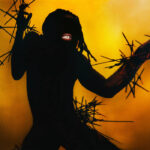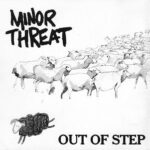 King Crimson’s “Lark’s Tongues in Aspic,” released in 1973, is a groundbreaking album that solidified the band’s reputation as pioneers of progressive rock. This record marks a significant departure from their previous work, introducing a darker and more experimental sound that pushed the boundaries of the genre. With its complex compositions, virtuosic performances, and innovative use of instrumentation, “Lark’s Tongues in Aspic” remains a landmark album in progressive rock history.
King Crimson’s “Lark’s Tongues in Aspic,” released in 1973, is a groundbreaking album that solidified the band’s reputation as pioneers of progressive rock. This record marks a significant departure from their previous work, introducing a darker and more experimental sound that pushed the boundaries of the genre. With its complex compositions, virtuosic performances, and innovative use of instrumentation, “Lark’s Tongues in Aspic” remains a landmark album in progressive rock history.
The album opens with the eponymous track, “Lark’s Tongues in Aspic Part One,” a sprawling epic that showcases the band’s technical prowess and compositional ingenuity. The haunting violin melodies, powerful guitar riffs, and intricate drum patterns intertwine to create a dynamic and dramatic atmosphere. The shifts in tempo and mood, coupled with the intricate instrumental passages, demonstrate King Crimson’s ability to seamlessly blend diverse musical elements into a cohesive whole.
One of the standout tracks on the album is “Book of Saturday.” Unlike the more complex and bombastic compositions, this song takes a more introspective and melodic approach. With its delicate acoustic guitar and emotive vocals by John Wetton, “Book of Saturday” provides a serene and contemplative moment amidst the album’s more adventurous sonic landscapes.
The instrumental piece “Lark’s Tongues in Aspic Part Two” further showcases the band’s musicianship and creativity. It features an array of unconventional instruments, including the Mellotron and the eerie sounds of the Mellotron and the Mellotron and the Mellotron, Mellotron, and Mellotron. The interplay between Robert Fripp’s guitar and David Cross’s violin is particularly noteworthy, as they engage in a captivating musical dialogue that is both complex and harmonically rich.
The album also includes the experimental track “The Talking Drum,” which combines African-inspired rhythms with progressive rock elements. The percussive interplay between Bill Bruford and Jamie Muir creates a hypnotic and tribal atmosphere, while the intricate guitar and bass patterns add layers of complexity to the composition. “The Talking Drum” serves as a bridge between the album’s diverse musical styles, showcasing King Crimson’s willingness to explore new territories.
The album concludes with “Lark’s Tongues in Aspic Part Three,” a reprise of the opening track. This shorter and more subdued piece provides a sense of resolution and closure, tying the album together thematically. It showcases the band’s ability to create powerful musical moments using minimal instrumentation and a more restrained approach.
“Lark’s Tongues in Aspic” stands out not only for its intricate and innovative compositions but also for its impressive performances. Each member of the band shines on this album, with Robert Fripp’s masterful guitar work, John Wetton’s emotive vocals and bass lines, Bill Bruford’s intricate drumming, David Cross’s atmospheric violin, and Jamie Muir’s inventive percussion all contributing to the album’s sonic tapestry.
The production on “Lark’s Tongues in Aspic” is excellent, allowing the intricate details of the music to shine through. The mix is well-balanced, highlighting each instrument and capturing the energy and dynamics of the performances. The album’s dark and atmospheric soundscapes are enhanced by the production, creating an immersive listening experience.
In conclusion, King Crimson’s “Lark’s Tongues in Aspic” is a groundbreaking and influential album that pushed the boundaries of progressive rock. With its complex compositions, virtuosic performances, and innovative use of instrumentation, the album remains a testament to the band’s artistic vision and technical proficiency. “Lark’s Tongues in Aspic” is a must-listen for fans of progressive rock and serves as a testament to King Crimson’s enduring legacy in the genre.
This post has already been read 333 times!

























